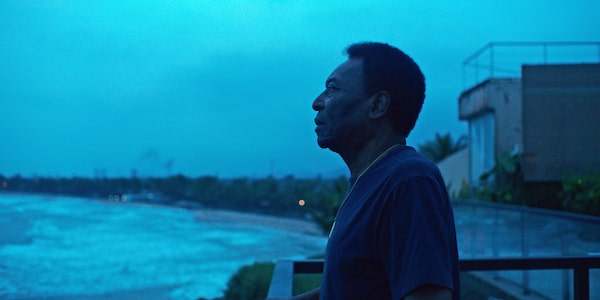
Pelé is a terrific examination of the player, the man and his status in recent Brazilian history.Courtesy of Netflix
A few years ago, I was in Buenos Aires to cover a soccer match. Argentina 1, Colombia 0, was the outcome. After the match, I was in a nearby steakhouse with my translator, who was a professor at the university there, and my host, one Carlos Pachame.
Binge-watching guide: More than 30 series and specials to help you get through winter
Carlos had an exemplary career as player and coach. He’d played for several club teams and Argentina’s national team. He was assistant coach when Argentina won the World Cup in 1986, in the glory days of Diego Maradona. We talked the hell out of the match and then came the digression I knew was coming: Maradona or Pele, who was the greatest? I knew it was coming because it is an eternal grievance in Argentina that the Brazilian Pele is, in the eyes of the world, the superior figure. To my two friends in the steakhouse, Pele was great but “empty,” a man with little personal charisma and, frankly, a bit shifty.

The documentary looks back at the extraordinary 12-year period in which Pelé, the only man to win three World Cup titles, went from young superstar in 1958 to national hero in 1970; a radical yet turbulent era in Brazil’s history.Courtesy of Netflix
Pelé (new on Netflix) is a terrific examination of the player, the man and his status in recent Brazilian history. It’s about his astonishing skill, his World Cup victories and defeats, and his celebrity. But at its core it’s about how Pele legitimized the dictatorship that governed Brazil during the later portion of his career.
It opens with footage from the 1970 World Cup in Mexico, one of the best tournaments ever. It is, for many soccer followers, an intrinsically important set of games. It was the first World Cup to be truly seen around the world on TV, in colour, and the most memorable storyline was Brazil in their yellow shirts, playing the sort of dazzling, exhilarating soccer, led by Pele, to the final game and triumph.

The film opens with footage from the 1970 World Cup in Mexico, one of the best tournaments ever.Courtesy of Netflix
Filmmakers Ben Nicholas and David Tryhorn deftly intercut the footage with scenes from Brazil during the murderous dictatorship then running the country.
Into the frame comes Pele today, aged 80 and moving with the aid of a walker. (Later he’s seen in a wheelchair.) His famous smile is still there but the film is also framed like a probing examination that borders on an interrogation. For much of the time Pele sits alone in a chair in an empty room. Sometimes he watches footage from the old days, again alone, and when he speaks, he talks very carefully about the way he navigated his professional life.
He’s much happier talking about the games, the tactics, the victories and defeats. It is others who do the real talking, though. Former teammates and journalists go deep into the bitter recollection of that time period when Pele appeared to play along with leaders responsible for monstrous human-rights abuses, including torture.

The documentary is an admiring portrait in many ways.Courtesy of Netflix
The film is an admiring portrait in many ways. It creates a fine portrait of Pele, the young genius, who was internationally famous at the age of 17 when he played at the 1958 World Cup. It offers a gripping perspective on his stardom in Brazil, the media circus that always surrounded him and the way he used that smile and his ease with celebrity to become both rich and beloved. And there is a ton of footage from tournaments where he either enchanted or, as in the case of the 1966 World Cup in England, was hacked at and fouled so often he could barely function.
It is also good at establishing the rise of Brazil, the country, from agricultural backwater with an inferiority complex to a modern, confident country. The national soccer team and Pele played a major symbolic role in that. By the time of the 1966 World Cup, the military dictatorship had already taken over. Asked now what that meant for him, he says, “Football went on in the same way; there weren’t notable differences for me.” He is at pains to point out that he was always happy to meet people and discuss things, and never thought of himself as a political figure.

The film is framed like a probing examination that borders on an interrogation.Courtesy of Netflix
In the end, though, this elderly man sitting in a wheelchair is obliged to grapple with the meaning of the World Cup victory in 1970 and how it was manipulated by the dictatorship.
Tearfully, he says, “The 1970 World Cup was the best time of my life, but it was more important for the country because if Brazil had lost in ’70 everything could have become worse. The whole country could take a breath when we became champions.” At another point, feeling the pressure to explain himself, he simply says, “I am no superman.”
The viewer can judge him or feel for him, in his frailty and in his need to savour the glory days, not the bitter days. All I can say is, yes, he can seem, as Carlos Pachame said, a bit shifty. But Carlos is a Maradona man, and always will be.

Courtesy of Netflix
Plan your screen time with the weekly What to Watch newsletter, with film, TV and streaming reviews and more. Sign up today.